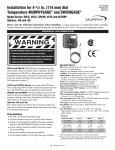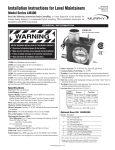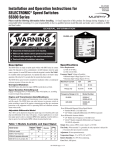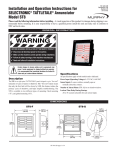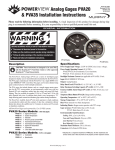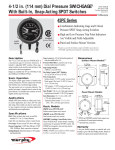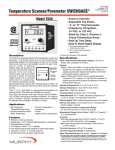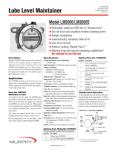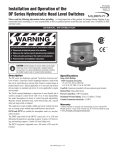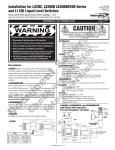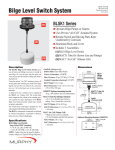Download Murphy HD9063 Series User's Manual
Transcript
Installation and Operation Instructions for Dual Set Point Speed Switch HD-96044N Revised 03-01 Section 20 (00-02-0179) HD9063 Series Please read the following information before installing. A visual inspection of this product for damage during shipping is recommended before mounting. It is your responsibility to have a qualified person install this unit and make sure it conforms to NEC and local codes. GENERAL INFORMATION WARNING BEFORE BEGINNING INSTALLATION OF THIS MURPHY PRODUCT ✔ ✔ ✔ ✔ Disconnect all electrical power to the machine. Make sure the machine cannot operate during installation. Follow all safety warnings of the machine manufacturer. Read and follow all installation instructions. Description Specifications The HD9063 Series is a unitized two set point speed switch with SPDT relay outputs. HD9063 is a PC-board configuration with standoffs for mounting in a control panel or cabinet. Power Supply: Voltage: 8-30 VDC Maximum Current: 150 mA Frequency Signal: Voltage, Magnetic Pickup Signal Models • Minimum: 0.35 Vrms • Maximum: 60 Vrms Maximum Current, Magnetic Pickup Signal Models: 4.8 µA. Adjustment Range, Magnetic Pickup Signal Models • HD9063 Model Crank Disconnect: 250-6,000 Hz Overspeed: 1,100-10,000 Hz • HD9063-USOS Model Underspeed: 200-5,800 Hz Overspeed: 1,100-10,000 Hz Reset Differential, Magnetic Pickup Signal Models • HD9063 Model Crank Disconnect: Dropout 160 Hz ± 5% Overspeed: 200 Hz Differential • HD9063-USOS Model Underspeed: +5% of Set point Differential Overspeed: 155 Hz ± 10% Differential Models are available for crank disconnect/overspeed and for underspeed/overspeed applications. Trip points can be field adjusted on all models. LED’s next to the set point potentiometers indicate that the trip point has been reached and the relay(s) have operated. An overspeed test circuit is built-in; it will actuate the output relay at a point below actual overspeed set point. The HD9063 can disconnect the starter on automatic start engine applications and shutdown the engine if an overspeed situation occurs. Re-engagement of the starter is inhibited until RPM returns virtually to zero. HD9063-USOS models allow operation of control circuits according to the speed of the driver or as a pre-alarm. Two separate adjustable speed switches are included on one common board. Output: Relay Contact, SPDT, Resistive Load: (2) 5 A, 30 VDC Adjustment: (2) 270°–turn potentiometer Temperature Range: 14 to 158°F (-10 to 70°C) HD-96044N page 1 of 4 MOUNTING DIMENSIONS HD9063 and HD9063-USOS EAS I CR CRANK DISCONNECT N CR EAS E 2-1/4 in. (57 mm) Mounting Holes N E I 4 in. (102 mm) Mounting Holes OVERSPEED EXT. MAG. PICKUP INTERNAL CRANK DISCONNECT RELAY CONTACTS EXT. TEST NC NO C NC NO C EXT. POWER 2-3/4 in. (70 mm) INTERNAL OVERSPEED RELAY CONTACTS (+) ( ) (+) ( ) 1 2 3 4 5 6 7 8 9 10 11 12 4-1/2 in. (114 mm) Mounting Standoffs 4 Places 3/4 in. (19 mm) Mounting 1. Drill four 3/16 in. (5 mm) diameter mounting holes (refer to mounting hole dimensions above). 2. Align the plastic standoffs on the HD9063 with the 4 mounting holes and push gently until standoffs snap into place. CAUTION: Pushing too hard could damage board. Mounting 1. Drill four 1/4 in. (6 mm) diameter mounting holes (refer to mounting hole dimensions above). 2. Secure with four 10-32 screws. RELAY FUNCTIONS Crank Disconnect Relay Overspeed and Underspeed Relay An understanding of the crank disconnect function for your particular system is critical to speed switch installation. It is also important to consider the 5 A current limitation of K1 relay contacts. Figure 1 illustrates the use of a low-current pilot relay to operate the high-current starter solenoid. In operation, battery voltage is supplied through the normally closed contacts of the speed switch crank disconnect relay K1. When the engine starts, K1 energizes and its normally closed contacts open. This action de-energizes the pilot relay and inhibits the starter from operating until the engine nearly stops. The normally open contacts may be used if a contact closure is required to disable the cranking function for your system. NOTE: Underspeed relay available on HD9063-USOS only. The overspeed and underspeed functions of the speed switch may be used in various systems to effect engine shutdown or actuate an alarm in the event of engine overspeed or underspeed. Figure 2 illustrates the overspeed/underspeed function being used to control a fuel rack solenoid. In this application, battery voltage is available to the solenoid through normally open contacts of the relay (K2 overspeed) (K1 underspeed). If the engine speed exceeds the normal overspeed or underspeed set point, relay K1 or K2 energizes and this voltage energizes the solenoid, shutting down the engine. Similarly, the normally closed contacts may be used if engine shutdown is to be initiated by removal of battery voltage. Underspeed Relay K1 NO Crank Disconnect Relay K1 1 Overspeed Relay K2 NC 2 NO 3 1 NC 2 Contact opens on overspeed or underspeed and drops out solenoid. 3 Battery Crank Enable 1 2 3 Energize Starter Pilot Relay Battery OPTIONAL Off Hold NO To Starter Solenoid Battery Energize Start Figure 1 Starter Switch Starter Contactor Relay Figure 2 HD-96044N page 2 of 4 Starter WIRING CAUTION: PERFORM THE WIRING OPERATION WITH THE POWER SOURCE “OFF” 1. Connect terminal 5 on the HD9063 to engine ground and connect terminal 4 to battery positive (see Figure 3). 2. Connect the magnetic pickup cable conductors to terminals 6 and 7. 3. If cable is shielded, connect shield to engine chassis ground. 4. If desired, connect a normally open test push button switch between terminals 8 and 9. 5. Connect crank disconnect circuit to crank disconnect terminals 1 thru 3 as discussed in Crank Disconnect Relay Function, page 2. On HD9063-USOS models connect the overspeed circuits 1 thru 3 as discussed in Overspeed Relay and Underspeed Relay Function, page 2. 6. Connect the overspeed circuits to overspeed terminals 10 thru 12 as discussed in Overspeed Relay and Underspeed Relay Function, page 2. (+) ( ) (+) ( ) 1 2 3 4 5 6 7 8 9 10 11 12 K1 K2 12 To Engine Crank Control Circuit or to Shutdown Circuits (HD9063-USOS) Common Common Normally Open Normally Open Normally Closed Normally Closed To Shutdown Circuits Test Pushbutton DC Positive DC Negative (Engine Ground) From Magnetic Pickup Figure 3 MAGNETIC PICKUP INSTALLATION A magnetic pickup is an AC generator. It is normally installed into the flywheel housing of an internal combustion engine, so that the starter ring gear acts upon it to generate a voltage pulse each time a gear tooth passes the end of the sensor. Gap Adjustment Insert magnetic pickup and turn until it stops at the face of the gear. Back-off the gear by turning the pickup counterclockwise 1/4, 1/2, or 3/4 turn (Figure 4) . See Gap Chart (above, right) to determine gap 1/4 distance based on the turn. Check gap clearance by rotating the gear completely around. NOTE: Magnetic pickup gap should be 1/2 3/4 adjusted so that the minimum voltage required is attained at the engine’s lowest RPM. The voltage will increase as the speed increases. Figure 4 If erratic readings occur, remove magnetic pickup and check the magnetic tip for metal chips. THREAD SIZE TURN 1/4 1/2 3/4 1 5/8-18 UNF .013 in. (0.33 mm) .028 in. (0.71 mm) .035 in. (0.88 mm) .055 in. (1.39 mm) 3/4-16 UNF .015 in. (0.38 mm) .030 in. (0.76 mm) .045 in. (1.14 mm) .062 in. (1.57 mm) GAP Magnetic Pickup Installation (see Figure 5) Drill and tap a hole in the flywheel housing (See Specifications Chart below for model and thread size). IMPORTANT: Drilling too deep may damage ring gear teeth. Blow chips with air hose when drilling and tapping hole. Gap Chart Always use a two-conductor shielded cable. Ground the shield to a metal frame ground at the engine end only. Never run these wires next to spark plug wires or in wire loom with other wires carrying inductive loads or alternating current. After adjusting, set locknut. Drill and tap casing (see thread sizes in Specifications). AC Meter Gap (see Gap Chart) Casing Murphy Magnetic Pickup Specifications Chart Pickup Model Total Length Threaded Length MP3298* MP7906† MP7905†† 3 in. (76 mm) 3 in. (76 mm) 4-1/2 in. (114 mm) 3 in. (76 mm) 3 in. (76 mm) 4-1/2 in. (114 mm) Thread Size 5/8-18 UNF 3/4-16 UNF 3/4-16 UNF *Replaces 20-01-0080 and MP100. Lead wire hookup (12 in. [305 mm]). †Replaces 20-01-0081. Lead wire hookup (12 in. [305 mm]). 20-01-0082. Lead wire hookup (12 in. [305 mm]). ††Replaces HD-96044N page 3 of 4 NOTE: Clean gear casing and magnetic sensor of metal chips or filings. Figure 5 Gear (must be made of magnetic material). ADJUSTING THE SPEED SWITCH EAS I CR N CR EAS E Crank Disconnect or Underspeed LED N E I Overspeed Potentiometer Overspeed LED EXT. MAG. PICKUP EXT. TEST NC NO C NC NO C EXT. POWER (+) ( ) (+) ( ) 1 2 3 4 5 6 7 8 9 10 11 12 Figure 6 Crank Disconnect Set Point Adjustment 1. If engine serves as a backup for an electric pump or other motor driven device, turn off the associated electric motor. 2. Reset any associated switches. 3. Ground engine ignition system or shut off fuel to engine to disable engine from starting. 4. Loosen locknut on Crank Disconnect set point potentiometer and turn potentiometer fully clockwise. 5. Operate electrical switch(es) as appropriate so that engine will begin to crank. 6. While engine is cranking, slowly turn Crank Disconnect Set point potentiometer counterclockwise until Crank Disconnect LED lights (Figure 6). Engine should stop cranking. 7. Now turn the potentiometer clockwise 1/16 turn. 8. Enable engine and allow it to start, verifying that starter disengages. If starter motor stays engaged too long, lower set point slightly by turning potentiometer counterclockwise in increments of no more than 1/16 turn. Re-test after each adjustment by starting engine, and continue adjustment until starter disconnects as soon as engine starts. If starter motor does not stay engaged long enough, raise set point slightly by turning potentiometer clockwise in increments of 1/16 turn. Re-test after each adjustment. 9. Tighten locknut on Crank Disconnect set point potentiometer. NOTE: A starter protection feature prevents starter from being engaged until engine almost completely stops after running. MURPHY DE MEXICO, S.A. DE C.V. Blvd. Antonio Rocha Cordero 300, Fracción del Aguaje San Luis Potosí, S.L.P.; México 78384 +52 444 8206264 fax +52 444 8206336 Villahermosa Office +52 993 3162117 e-mail [email protected] www.murphymex.com.mx 1. Loosen locknut on Overspeed set point potentiometer and turn potentiometer fully clockwise. 2. Start engine and run at highest normal operating RPM. 3. Slowly turn Overspeed adjustment potentiometer counterclockwise until overspeed switch trips or engine shuts down. The LED light should flash. 4. Turn potentiometer approximately 2° clockwise, then tighten locknut. 5. Reset switches as applicable and restart engine. NOTE: An overspeed test switch connected as shown in Figure 3 provides a means for decreasing set point for test purposes. 6. If a test push button is installed, press push button and verify that overspeed LED (Figure 6) flashes and engine shuts down or switch trips. UNDERSPEED NOTE: Underspeed is available on HD9063-USOS models only. 1. Loosen locknut on Underspeed set point potentiometer and turn potentiometer fully counterclockwise. 2. Start engine and run at lowest normal operating RPM. 3. Slowly turn Underspeed adjustment potentiometer clockwise until underspeed switch trips or engine shuts down. The LED light should flash. 4. Turn potentiometer approximately 2° counterclockwise, then tighten locknut. 5. Reset switches as applicable and restart engine. NOTE: An overspeed test switch connected as shown in Figure 3 provides a means for decreasing set point for test purposes. 6. If overspeed test push button is installed, press push button and verify that overspeed LED (Figure 6) flashes and engine shuts down or switch trips. Warranty A limited warranty on materials and workmanship is given with this FW Murphy product. A copy of the warranty may be viewed or printed by going to www.fwmurphy.com/support/warranty.htm FRANK W. MURPHY, LTD. Church Rd.; Laverstock, Salisbury SP1 1QZ; U.K. +44 1722 410055 fax +44 1722 410088 e-mail [email protected] www.fwmurphy.co.uk MURPHY SWITCH OF CALIFORNIA 41343 12th Street West Palmdale, California 93551-1442; USA +1 661 272 4700 fax +1 661 947 7570 e-mail [email protected] www.murphyswitch.com MACQUARRIE CORPORATION 1620 Hume Highway Campbellfield, Vic 3061; Australia +61 3 9358 5555 fax +61 3 9358 5558 e-mail [email protected] RE FW Murphy P.O. Box 470248 Tulsa, Oklahoma 74147 USA +1 918 317 4100 fax +1 918 317 4266 e-mail [email protected] www.fwmurphy.com CONTROL SYSTEMS & SERVICES DIVISION P.O. Box 1819; Rosenberg, Texas 77471; USA +1 281 633 4500 fax +1 281 633 4588 e-mail [email protected] OVERSPEED GI D Crank Disconnect Underspeed Potentiometer or (HD9063-USOS) Potentiometer Overspeed and Underspeed Set Point Adjustment E Adjustment of the Dual Set point Speed Switch is performed when the system is otherwise operational in all respects. See Figure 6 for location of Crank Disconnect, Underspeed and Overspeed potentiometers. STER USA–ISO 9001:2000 FM 28221 UK–ISO 9001:2000 FM 29422 In order to consistently bring you the highest quality, full featured products, we reserve the right to change our specifications and designs at any time. Printed in U.S.A. HD-96044N page 4 of 4





